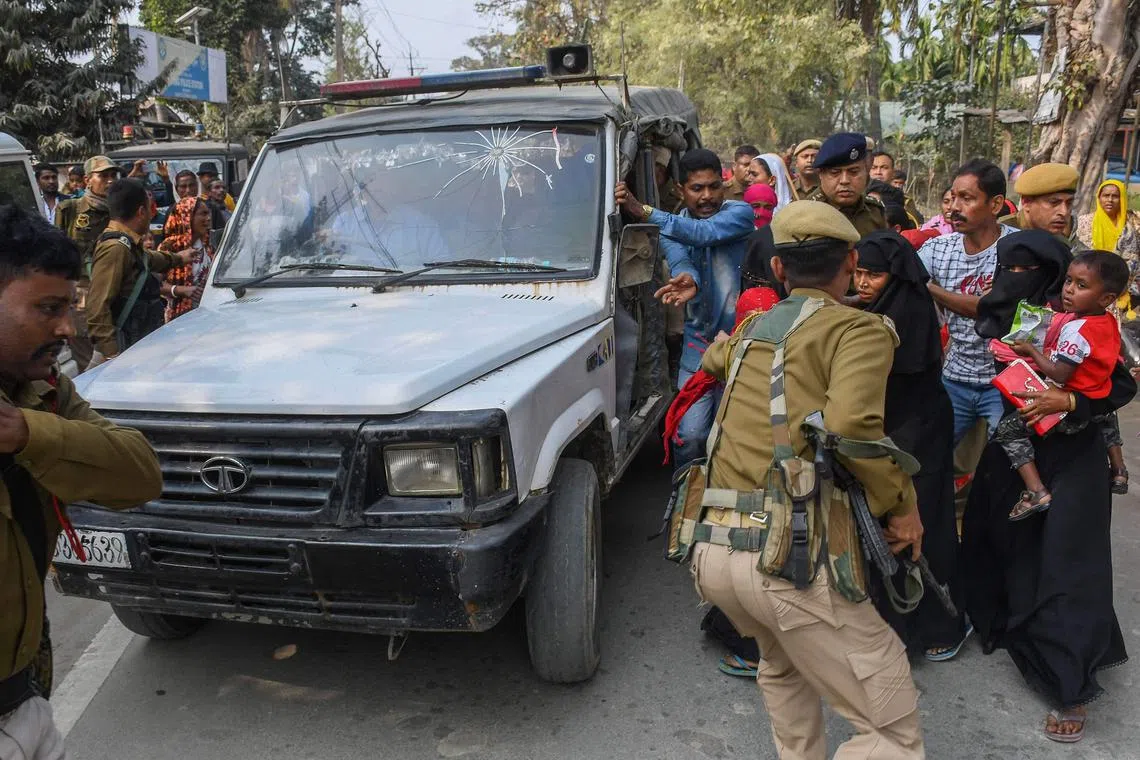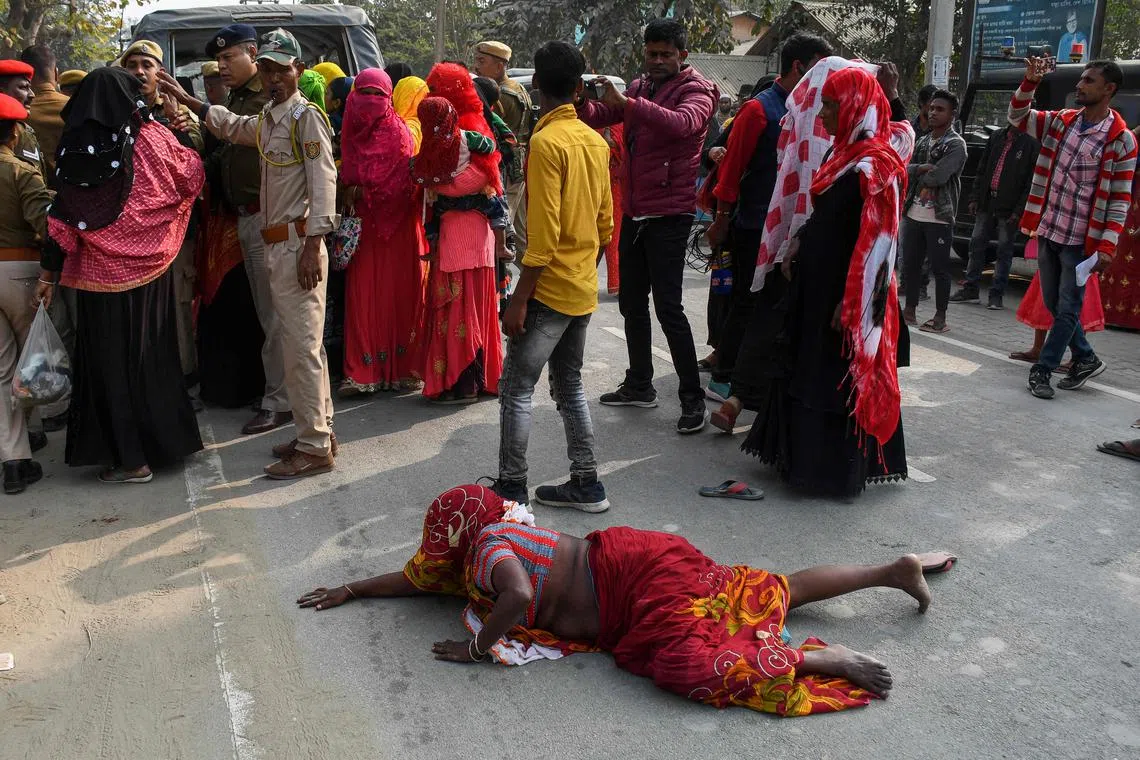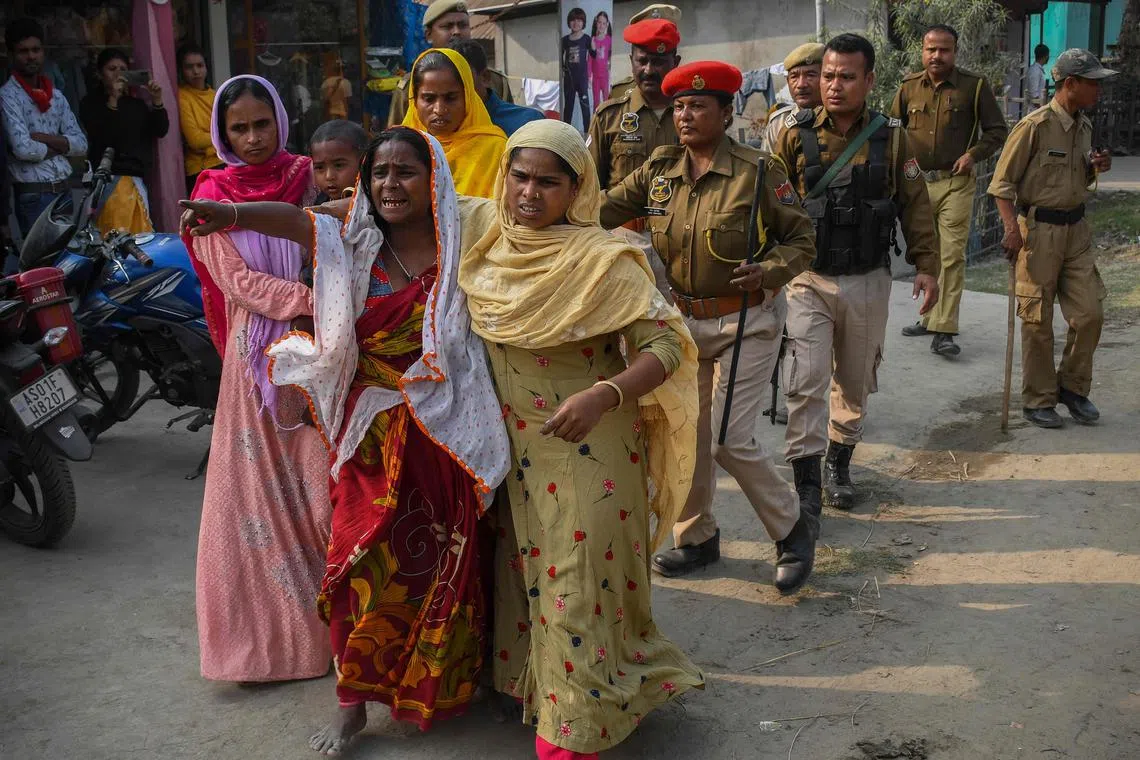Crackdown on child marriages in India’s Assam state leaves trail of broken families
Sign up now: Get insights on Asia's fast-moving developments

Relatives gather near the Mayong police station in India's Assam state as people allegedly involved in child marriages are being taken to a court on Feb 4.
PHOTO: AFP
Follow topic:
NEW DELHI – Ms Jahanara Khatun is someone the authorities claim to have rescued from the clutches of child marriage in the north-eastern state of Assam. But it was a knock on her door at around 11pm on Feb 5 from the police, who came to act seemingly on her behalf, that turned her “peaceful” life upside down.
In 2018, she was 17 years and three months old when she fell in love with Mr Mohammed Akhirul Hoque and chose to marry him.
She gradually settled into married life, giving birth to a daughter in 2021.
Yet, for the authorities, she is a victim.
India’s legislation against child marriage mandates a girl must be over 18, and a boy over 21, before marriage.
The police therefore came to arrest her husband and father-in-law at their house in Bausatari, a village in Assam’s Goalpara district.
The swoop was part of a controversial statewide crackdown that began in the last week of January
With about 2,800 arrests, the authorities have been compelled to convert a stadium and a detention centre for foreigners into temporary jails, even as they face criticism over retrospective punitive arrests that have split families from poor socio-economic backgrounds, put their main breadwinners in jails and thrown their future into disarray.
Mr Hoque, who was a little more than 18 at the time of his marriage, had fallen foul of the Prohibition of Child Marriage Act. The Act makes it a crime for a male adult, defined as being above 18 years old, to marry a girl who is under 18.
The police did not find Mr Hoque, who works nearly 2,800km away in the southern city of Bangalore, but arrested his father Mohammed Amejuddin, 65, for allowing the marriage to go ahead.
Ms Khatun’s father, Mr Mohammed Jahanuddin, 40, was also taken into custody from his house.
This intervention, however, has left Ms Khatun more worried than ever.
She has no news about her husband, who has been untraceable, even switching off his phone to evade arrest. She and her daughter are, meanwhile, dependent on her brothers-in-law for support.
The state has said it is working on a rehabilitation policy for victims of child marriage, but that is little consolation.
“I had a peaceful life but the government has completely messed it up,” Ms Khatun told The Straits Times over the phone.
“I want my father and father-in-law to be released and my husband to return safely,” she added.
On Jan 23, Assam Chief Minister Himanta Biswa Sarma, who belongs to the Bharatiya Janata Party, announced the crackdown on child marriages, citing worrying data from a government survey released last year.
The percentage of women aged 15 to 19 in 2019 who were mothers or pregnant in Assam was 11.7, compared with the country’s average of 6.8 per cent.
Around 31.8 per cent of women aged 20 to 24 in the state were also married before they turned 18. This figure was 23.3 per cent for India.
There are also multiple instances of girls, often seen as a burden in poorer families, being forced into marriage against their will or being ill-treated at their husband’s home.
Yet, the arrests have prompted concern from child rights activists, the media and legal experts who argue that the clampdown is hardly the right way to solve the problem that has deep-rooted social complexities.
Professor Faizan Mustafa, a constitutional law expert, said the Assam government should use education and awareness campaigns rather than coercive criminal law to deal with the problem of child marriages. “For such social problems, we must give education to the young girls. If the problem is more acute among Muslims, then all the more reason to take them to schools,” he told ST.
The spread of education and awareness schemes has seen incidences of child marriages among women aged 20 to 24 decline from 47.4 per cent in 2005-06 to 23.3 per cent in 2019-21.
“You need to remove patriarchy, give education and financial independence to girls. And the problem will be automatically solved,” added Prof Mustafa.
“This is essentially a problem of poverty and illiteracy. I haven’t heard of an educated or rich person marry off their daughter who is a minor.”
Since the arrests began, hundreds of women have protested across the state, demanding their husbands and sons be released.
Videos of a woman wailing outside a police station in Barpeta district and rolling on the ground have swirled online, fanning distress as well as anger.

People gathering outside the Mayong police station in the Indian state of Assam on Feb 4, after their relatives were arrested for allegedly being involved in child marriages.
PHOTO: AFP
Tragedies have unfolded too.
A 17-year-old girl in Cachar district killed herself after her parents refused to allow her to marry the boy she loved.
In another case, a 27-year-old in South Salmara-Mankachar district committed suicide because she feared her parents would be arrested for allowing her to get married before she turned 18.
A 16-year-old even bled to death after delivering a girl at her home in Bongaigaon district as her family did not take her to the hospital, fearing arrest.
Media reports indicate that districts with a higher Muslim population in the state have seen more arrests than others, though hundreds of Hindus have also been arrested.
This has prompted concerns that the campaign is being used to target Muslims, who account for about 34 per cent of the estimated 32 million population in Assam, where there is already deep religious polarisation.

People gathering outside the Mayong police station in the Indian state of Assam on Feb 4, after their relatives were arrested for allegedly being involved in child marriages.
PHOTO: AFP
The campaign against child marriage, the state’s Chief Minister said, will continue until the 2026 state elections.
“I am sending a very strong message to certain communities that you cannot do this. You cannot violate the law and if you do so, action will be taken against all,” Mr Sarma told the Times Now news channel last Tuesday.
Mr Ainuddin Ahmed, convenor of Balya Bibaha Birodhi Mancha Assam, a forum that claims to have prevented around 3,500 child marriages in the state since 2017, welcomes the government’s action.
But he said it must be accompanied by supportive measures such as counselling centres for victims of child marriages as well as supportive packages, besides exploring the need for any reform to update laws pertaining to child marriage.
“Assam’s minorities also want their children to be educated. They too want them to become doctors and engineers,” he added.

